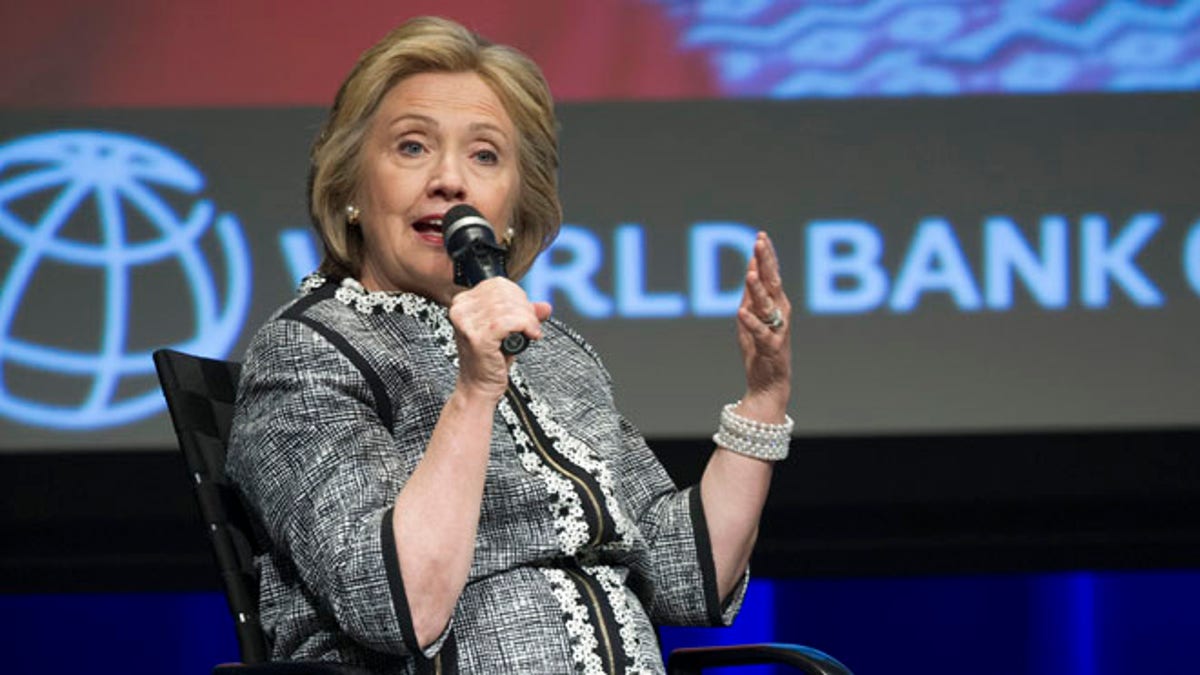
Former Secretary of State Hillary Clinton at World Bank headquarters in Washington, Wednesday, May 14, 2014. (AP)
The pundits are pouncing on Hillary Clinton’s television interviews, parsing every sentence in a nonstop effort to discern her weaknesses.
And yes, I’m one of them.
But that’s not how ordinary people watch these things.
Professional commentators are paid to analyze, scrutinize and criticize. I certainly thought that Hillary stepped in it, for example, with her riff to Diane Sawyer about having been “dead broke,” which she tried to dig out of yesterday with Robin Roberts by saying she understands the problems of ordinary people.
Others are examining Hillary’s answers on the lack of security in Benghazi, and her refusal to accept Sawyer’s invitation to begin a sentence with “I should have…”
But average viewers aren’t going through a litmus checklist of issues. They form an overall impression of a potential presidential candidate and how she handles herself. They look to see whether she has a sense of humor. They decide, in short, whether they like and trust her.
On that score, my impression is that Hillary has come across as more relaxed and less guarded than in 2008. And, in fact, she admitted to Sawyer that she was too programmed in that campaign:
“Because when you're in the spotlight as a woman, you know you're being judged constantly. I mean, it is just never-ending. And you get a little worried about, 'Okay, you know, people over on this side are loving what I'm wearing, looking like, saying.' And people over on this side aren't. Your natural tendency is how do you bring people together so that you can better communicate. I'm done with that. I mean, I'm just done.”
Hillary talks more freely now about being a woman, saying “we live with a double standard” and that she “was not as effective calling it out” in 2008 and that people should “think about their own daughters, their own sisters, their own mothers when they make comments about women in public life.”
So while the experts may challenge her response on the Russian reset, more people may warm to her explaining that she’s glad that Max won “Dancing with the Stars.”
In a conversation with NBC’s Cynthia McFadden that aired last night, Hillary danced around her 2016 decision by invoking the anticipation of Chelsea giving birth this fall. “I don’t want to be focused on something two years away. I want to be focused on this baby.” The grandmother factor is not to be minimized.
And when she gave her usual answer on Benghazi—she’s not sure what else she could have done—Clinton showed McFadden a photo of the late ambassador Chris Stevens that she keeps in her office. That projects caring.
She starts from a strong base. In an ABC/Washington Post poll, “two-thirds said Clinton is a strong leader; six in 10 said she was honest and trustworthy; and majorities said Clinton understood people like them and had new ideas for the country.” (Of course, there is a deep partisan divide: 94 percent of Democrats, and 40 percent of Republicans, said she’s a strong leader.)
It’s also true that Hillary’s numbers will inevitably drop once she becomes a candidate and is subjected to daily political warfare.
Meanwhile, various publications are offering their own assessment of the central question of “Hard Choices”: what about Clinton’s record as secretary of State?
“Her critics are correct in the sense that her record isn't particularly impressive,” says the New Republic. “But that is the fault of the way administrations, especially the Obama administration, now function…Even if you want to argue that Clinton had no huge successes, her tenure had no gigantic managerial failures either.” Except Benghazi, criticism of which is blamed on the “extreme right.”
Politico puts it this way:
“The media and political debate on Clinton’s time as secretary has been particularly shallow because it lacks historical context and an appreciation for what success in diplomacy really means. So what does make a great secretary of state? And how does Clinton stack up?
“Let’s start by asking the question is a different way. When was the last time any U.S. secretary of state notched any truly historic accomplishments? Certainly not recently. One would have to go back to James Baker, who served under George H. W. Bush, to find them.”
So she didn’t do anything outstanding at State, but it doesn’t matter because Cabinet officers have little influence and there hasn’t been a highly successful secretary in more than two decades. Not the kind of thing you can slap on a bumper sticker.












































